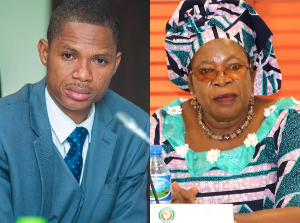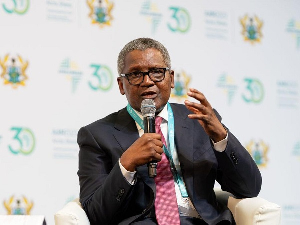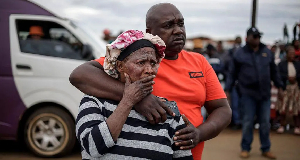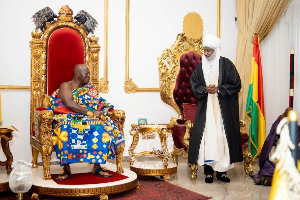Professor S. Kwaku Asare
Some field evidence on what Ghanaians think of the 4th Republican Constitution
I present the results of a survey that was conducted from February 22, 2010 to March 21, 2010. The purpose of the survey was to collate the views of Ghanaians everywhere on the 4th Republican Constitution. Survey respondents participated voluntarily by accessing a link that was placed on www. Ghanaweb.com and other chat rooms known to and accessible to me (e.g., Okyeame@gogglegroups.com, glu-ghana-leadership-forum@googlegroups, elephant-patriots@googlegroups.com). In addition to accessibility, these sites were chosen because they are patronized by a good cross section of the population who frequently express views and debate on the Constitution. Therefore, survey respondents were not randomly chosen. However, given that the purpose of the survey was to collate views on the Constitution, I wanted respondents who had read the Constitution or were knowledgeable on the workings of the Constitution.
The survey consisted of 53 questions. Questions 1 to 5 asked some background questions about the respondents’ access to and knowledge of the Constitution while questions 51 to 53 asked demographic questions. Question 6 asked participants to rate the effectiveness of 20 Constitutional organs. Questions 7 to 15 asked questions about the executive; questions 16 to 26 asked questions pertaining to the legislature; and questions 27 to 34 addressed the judiciary. In addition, I asked questions about the district assemblies (question 34), death penalty (question 36), political parties (questions 37 to 40), CHRAJ (questions 41 to 45), transitional provisions (questions 46 and 47), chieftaincy (question 48), and general elections (questions 49 and 50). The appendix to this executive summary shows the questions asked, frequency distribution of the responses, and the number of participants who answered and skipped each question.
Demographic Profile of Respondents and Access to Constitution
One thousand two hundred and twenty six (1,226) participants responded to the survey. About 80% of the respondents were between the ages of 31 to 60 and most (95%) of the respondents were males. Approximately 37% of the respondents self-reported that they own a copy of the 1992 Constitution and only about 18.6% had read all chapters of the Constitution. Surprisingly, about 28.5% of the respondents had not read some of the chapters or parts of the 1992 Constitution and 18.1% indicated that they did not understand the contents of the Constitution. Only 7% felt they were extremely knowledgeable about the Constitution. About 25% of those who do not read their personal copies of the Constitution, access the Constitution through online sources such as Ghanaweb while about 17.1% borrow their friends’ copies. These responses suggest that the 4th republican Constitution is not available to, accessible to, read by and understood by many Ghanaians. Government should consider making it part of the curriculum at the secondary and tertiary levels.
Effectiveness of Constitutional Organs
The 4th Republican Constitution created several organs and charged them with specific responsibilities. How well have these organs discharged those responsibilities? To address this question, I asked the respondents to evaluate the effectiveness of 20 Constitutional organs on an 11 point scale where a score of 1 indicates “minimum effectiveness,” a score of 6 indicates “moderate effectiveness” while a score of 11 indicates maximum effectiveness. The mean (standard deviation) effectiveness rating for each of the 20 organs is tabulated in Table 1. Table also reports a raw ranking of the Constitutional organs as well as a statistical ranking. The statistical rankings are based on means that are statistically significant (i.e., I rank an organ as more effective than another only if the mean between the two organs cannot be satisfactory explained by chance. Technically, these are paired t-tests with significance level fixed at .05).
Respondents indicate that the Electoral Commission has been the most effective organ, with a mean effectiveness rating of 7.56. The Ghana Armed Force, Presidency and the Media are tied for second place, even though their mean effectiveness rating is less than 6 (moderate effectiveness). Parliament is considered least effective of the 3 branches of government at a mean score of 4.34. The Political Parties are ranked as third, ahead of CHRAJ and the National Security Council. The least effective organs are the Council of State, District Chief Executives, and the National Development and Planning Commission, who score below 4 on the effectiveness scale.
Overall, other than the Electoral Commission, it is clear that respondents think that these Constitutional organs have not been very effective in discharging their constitutional obligations.
Executive
The Constitution vests executive authority in the President who is elected, by universal suffrage, every fourth year. There has been debate about whether the 4 year tenure is too short, whether the President has excessive powers, whether the President should appoint ministers from Parliament, and the proper role of the Attorney General. To provide evidence on these issues, I posed 9 questions to the respondents. A significant majority of the respondents believe the 4 year term is adequate (70.6%), the President has excessive power (60.9%), and that the Attorney General’s position should be separated from the Minister of Justice (79%).
Approximately 83% of respondents did not believe that majority of ministers should be appointed from Parliament as currently required. On the issue of whether any ministers should be appointed from Parliament, 58% responded in the negative. An overwhelming majority of respondents (84%) believe a ceiling should be placed on the number of ministers. However, there is no consensus on what the ceiling should be. A plurality (40%) believes the ceiling should be more than 10 but no more than 20. About 80% believe that the ceiling should be less than 30.
The original 4th Republican Constitution did not recognize dual citizenship. However, Parliament amended the Constitution to allow dual citizenship, while keeping the clause that banned citizens who hold multiple allegiances from serving as ministers intact. The exact meaning of the “multiple allegiance” clause is in doubt and has not been interpreted by the Supreme Court. Nevertheless, the clause has been interpreted on the “streets” to ban dual citizens. What do respondents think of this ban? Approximately 63.3% believe dual citizens should not be disqualified from serving as ministers.
Parliament
The constitution vests legislative authority in Parliament. Over the years, 4 key issues have been debated about Parliament. First, who is qualified to be a Member of Parliament (resulting in the unseating of George Nyimakan of the Wulensi constituency, the current dispute between the State and Sakande Adamu, the Bawku Central MP)? Second, what is the proper number of MPs in a changing population? Third, whether some MPs have served too long, and finally, whether MPs can or should initiate private bills?
Regarding the first issue, the Constitution stipulates that an MP should hail from or reside in a constituency for a specified period before being eligible to contest as an MP. Approximately 63% of the respondents agreed with the requirement that a Parliamentary candidate should hail from the Constituency that he seeks to serve. An even bigger majority (77.1%) agrees that a Parliamentary Candidate should reside in the constituency that he seeks to serve as an MP. Moreover, about 75.6% of respondents believe there should be a “minimum residency” requirement for those seeking to serve as MPs. That is, respondents are not in favor of allowing carpetbaggers (those who relocate to a constituency primarily to contest for MP) to run for seats, which is surprising considering the proclivity of Ghanaians to move around the country. However, there is little consensus on what the minimum residency requirement should be. A plurality would want to see the minimum residency requirement set at 24 months prior to filing for nomination but 13% would be satisfied with a liberal residency requirement which will allow someone to contest as long as he is living in the constituency at the time that he is elected. As with ministers, an overwhelming majority (68.7%) believe dual citizens should not be disqualified from serving as MPs.
Approximately 75.6% believe a ceiling should be placed on the number of MPs but there is no clarity on what the ceiling should be. Approximately 30.2% will fix it at between 180 to 230 members while 26.3% will fix it at “no more than 140,” as it was in the Independence Constitution.
Which constitutional organ should determine the number of MPs assuming there is no ceiling as in the current constitution? Approximately 44.7% of the respondents believe the decision right should be allocated to the Electoral Commissioner but 41.8% believe it is Parliament that should decide this issue. Only 5.4% believe this should be in the hands of the President. It is surprising that the respondents will allocate this decision right to Electoral Commissioner, an unelected and unaccountable bureaucratic. Perhaps, the willingness to endow the Electoral Commissioner with this key right flows from respondents’ evaluation of the Electoral Commissioner as the most effective Constitutional organ.
A surprising majority (58.2%) believe that current constitution does not allow an MP to initiate a Private Members bill in Parliament, even though there is no such language in the Constitution. While majority (57.9%) believes there should be a term limit on MPs, there is no agreement on what the limits should be with a plurality (26%) wanting a one term 4 year tenure.
Judiciary
The judicial power is vested in the judiciary and in the exercise of that power that judiciary is subject only to the Constitution. Over the years, questions have arisen as to whether the absence of a ceiling on the number of Supreme Court Justices impaired the independence of the judiciary, whether the selective empanelling of Supreme Court justices by the Chief Justice encouraged opinion-shopping, and whether the Justices of the Supreme Court should be subject to mandatory retirement.
Approximately 91% of the respondents believe there should be a ceiling of the number of Justices of the Supreme Court. However, there is no consensus on what the ceiling should be. A plurality (33.1%) will set the ceiling at 9 compared to 21.3% who will set it at 11 and 19.8% who will set it at 7. With respect to empanelling members of the Supreme Court, a plurality (40.1%) believe all justices of the Supreme Court should sit on all cases before the Supreme Court while approximately 56.1% believe that Supreme Court decisions should be subject to review. A majority would want the Regional Tribunals to be removed from the court structure.
Approximately 68% consider the current mandatory retirement age of Justices as necessary. Further, over 82% think that the mandatory retirement age limits should be extended to all constitutional offices and a plurality (40.1%) say this limit should be set between 60 to years.
Political Parties
According to Article 55(3) of the Constitution the internal organization of a political party should conform to democratic principles. I asked the respondents to evaluate the extent to which current political parties conform to democratic principles on an 11 point conformance scale (with endpoints labeled “minimally conform” and “maximally conform”) and some specific questions on how such democratic principles can be realized. The rankings of the political parties are tabulated in Table 2.
First, the scores are low indicating respondents’ evaluation that political parties are generally not conforming to democratic principles. No party scores 7. Second, NPP is judged to be the party that has the highest conformance rate, followed by CPP, PNC and NDC.
With respect to the specific questions, majority ( 64.3% and 54.3% respectively) of respondents indicate that political parties should be required to allow all their registered members to vote in their election for a flag-bearer as well as their national executives. The respondents were even more emphatic when it came to their view of the election of parliamentary candidates where 79.8% indicated all registered members of the political parties should be allowed to vote.
CHRAJ
The Constitution empowers CHRAJ (a) to investigate corruption allegations; (b) cases of human right abuses; and (c) conflict of interest cases by public officials in the discharge of their duties. Some have argued that this remit is too broad and should be reduced. I asked the respondents for their views on this issue. With respect to the mandate, about 68.7% indicated that the mandate was not too broad. However, assuming it was decided to reduce CHRAJ’s mandate, a plurality suggests that the investigation of conflict of interest cases should be taken away.
Contrary to a Supreme Court ruling, which held that CHRAJ could not initiate corruption allegation sua sponte (on its own), 75% of the respondents indicate CHRAJ should be able to initiate corruption allegation on its own. An even higher percent (78.3) indicate that CHRAJ should have the power to prosecute current government officials, which contrasts with the current requirement that all prosecutions are to be initiated by the Attorney General.
On a related note, about 83.9% indicate that a prosecutor, not under the supervision of the Attorney General, should be appointed where it becomes necessary to prosecute current government officials.
Transitional Provisions and Immunity Clause
Section 34(1) the Transitional provision provide immunity to members and functionaries of the PNDC and 34(2) ousts the jurisdiction of the courts to entertain any actions brought before them in respect of actions taken by prior military regimes. Whether these provisions should be repealed from the Constitution has been subject to debate at various times during the 4th Republic. About 71% of the respondents indicate that the section 34(1) should be repealed and 65.3% indicate that section 34(2) should also be repealed.
Miscellaneous Issues
Approximately 78% say that District Chief Executives should be elected by registered voters in their districts. A majority (57.8%) will want the death penalty abolished. Approximately 78.8% are in agreement with the current constitutional requirement that prohibits chiefs from holding elected offices. A plurality (40.8%) suggests that general elections should be held 3 months before the inauguration date and approximately 76% will allow Ghanaians abroad to vote overseas.
Conclusion
Some clear themes emerge from the survey that has policy implications. First, even though the Constitution has been in operation since 1993, most Ghanaians do not own a copy and fewer still have read all the chapters or even parts of the Constitution. Perhaps, this explains why respondents thought the National Commission on Civic Education is ineffective. Going forward, affirmative action should be taken to make the Constitution more accessible to the populace. It might be useful to consider a mandatory course on the Constitution that starts from the JSS and continues through the Universities.
Second, with the exception of the Electoral Commission (EC), most Ghanaians believe the Constitutional organs are largely ineffective. I believe the high evaluation of the EC is attributable to the non-partisan and non-corrupt manner in which it discharges its constitutional responsibilities. If so, it is clear that other organs can improve their standing and reputation with the public by adopting the same non-partisan and non-corrupt attitude. The performance of the Council of State, District Chief Executives, and the National Development Planning Commission is rated very poorly, raising the question of whether and how they can be reformed. The citizens on these organs should step up the plate and do more or explain why they have been so ineffective.
Third, most Ghanaians want the size of government curtailed through the imposition of ceilings on the number of ministers, MPs and Supreme Court Justices. However, there is little consensus on what the ceilings should be suggesting the need for a national debate on this question.
Fourth, most Ghanaians are happy with the current 4-year tenure of the Presidency. However, they are concerned that the President wields too much power and would rather the President does not appoint ministers from Parliament.
Fifth, most Ghanaians would want to see a term limit on being a Member of Parliament. Sixth, most Ghanaians accept the concept of “equal citizenship” and want dual citizens to be accorded full citizenship rights, including the right to vote where they reside, the right to be voted for, and the right to serve as ministers of state.
Sixth, most Ghanaians do not think the Political Parties have internal democracy as required by the Constitution. At a minimum, they want the flag-bearers, national executives, and Members of Parliament chosen by all party members. This suggests that the Electoral Commission and the Political Parties should work up modalities to register party members and facilitate their voting at party congresses.
Finally, most Ghanaians want to see the repeal of the transitional provisions.
Table 1
Respondents Evaluation of Constitutional Organs on 11 Point Scale
Constitutional Organ Mean Standard Deviation Raw Ranking Statistical Ranking
Electoral Commission 7.56 2.98 1 1
Ghana Armed Forces 5.94 3.03 2 2
Presidency 5.92 3.07 3 2
Media 5.84 3.03 4 2
Political parties 5.50 2.86 5 3
CHRAJ 5.13 2.80 6 4
National Security Council 5.08 2.82 7 4
National Media Commission 4.73 2.74 8 5
Auditor General 4.72 2.69 9 5
Statistical Service 4.69 2.73 10 5
Judiciary 4.61 2.84 11 5, 6
Prison Service 4.45 2.74 12 6, 7
Parliament 4.34 2.87 13 7, 8
District Assemblies 4.20 2.65 14 8, 9
Public Service Commission 4.15 2.50 15 9
Police Service 4.07 2.72 16 9, 10
National Committee on Civic Education 4.03 2.67 17 10
Council of State 3.87 2.69 18 11
District Chief Executives 3.84 2.61 19 11
National Development and Planning Commission 3.75 2.54 20 11
Table 2
Respondents Evaluation of Political parties Conformance to Democratic Principles on 11 Point Scale
Political Party Mean Standard Deviation Raw Rank Statistical Rank
National Patriotic Party (NPP) 6.39 2.96 1 1
Convention Peoples Party (CPP) 5.70 2.73 2 2
Peoples National Convention (PNC) 5.14 2.63 3 3
National Democratic Congress (NDC) 4.86 2.97 4 4
Democratic Peoples Party (DPP) 4.29 2.61 5 5
Great Consolidated Popular Party (GCPP) 3.86 2.64 6 6
Every Ghanaian Living Everywhere (EGLE) 3.77 2.66 7 6
Ghana National Party (GNP) 3.76 2.61 8 6
Ghana Democratic Republican Party (GDRP) 3.61 2.62 9 7
United Ghana Movement (UGM) 3.56 2.65 10 7
National Reform Party (NRP) 3.18 2.64 11 8
Opinions of Wednesday, 27 October 2010
Columnist: Asare, Kwaku S.














